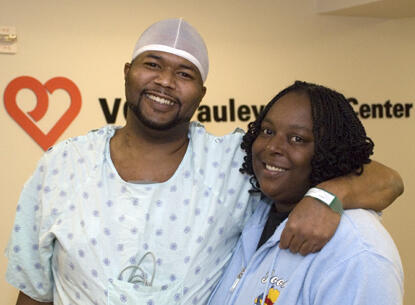
Dec. 18, 2009
VCU Medical Center Team Implants 25th Total Artificial Heart
Share this story
The Virginia Commonwealth University Pauley Heart Center has reached a milestone in artificial heart implant technology – transforming the life of its 25th patient – and the surgeon who launched the program at the VCU Medical Center says future patients can look forward to going home sooner.
In the little more than three years since a cardiac surgery team at VCU performed the first artificial heart implant on the East Coast, the Pauley Heart Center has seen an 85-percent survival rate among patients who undergo the “bridge-to-transplant” procedure, and a more than 95 percent survival rate among those who are then transplanted with donor hearts.
“Keep in mind that these patients all had a predicted 100 percent mortality without support from the Total Artificial Heart,” said Vigneshwar Kasirajan, M.D., chair of cardiothoracic surgery and head of the transplant team at VCU.
The SynCardia Total Artificial Heart is currently approved as a bridge to human heart transplant for patients dying from end-stage biventricular failure. It is the only device that provides immediate, safe blood flow through both ventricles and is the first and only FDA-approved total artificial heart in the world. The VCU Medical Center began performing the procedure in 2006.
“The whole goal of the device is that it takes someone who is really ill and at imminent risk of death, and we put the device in, and their quality of life is excellent,” Kasirajan said. “We can make them a lot better. They’re up and walking on the treadmill, their nutrition is better, they are healthier, and at that point we can give them a heart transplant in an optimal state and allow them to have a long-term, good quality of life.”
The patient who received the 25th implant at VCU, Joseph Cox, a 29-year-old carpenter from eastern Virginia, is well aware of how close he came to dying.
“I had 50 clots and two strokes” prior to receiving the implant on Oct. 6, Cox said. He received a donor heart on Nov. 14 and went home on Dec. 2.
“Before I had no energy, always wanted to sleep, didn’t want to eat,” Cox said. “Now all I want to do is eat and keep moving.”
Kasirajan explained that Cox arrived at the hospital very ill and rapidly progressed to heart failure.
“His heart was irreversibly damaged. He had clots going to his lung and brain and we really had to take the heart out,” Kasirajan said. “A suitable heart transplant could not be found in a timely fashion because his risk of death or complications was just days.
“So after careful consideration and discussion with him, we elected to put the total artificial heart in,” Kasirajan said. “He was extubated off the respirator the next day and walking within 24 hours and did remarkably well.”
Cox remained in the hospital about five weeks until a donor organ became available. Kasirajan said the average length of time on the device for patients has been about three months before they are transplanted.
“Going forward, technology is going to change significantly in terms of the driver that drives the artificial heart,” Kasirajan said. “The current driver is excellent, but we’re still not able to discharge patients home.
“I think in 2010 we’ll be able to start discharging patients home with a much smaller portable driver, and I think that will be a significant step forward in patient satisfaction, quality of life and acceptance of the technology overall,” Kasirajan said. “We would like to get them home sooner – to be with their families and enjoy a good quality of life while waiting for a transplant.”
The VCU Pauley Heart Center is among the most active of the 12 artificial heart implant centers in the United States, according to Don Issacs of SynCardia Systems Inc. Since Cox’s implant and transplant, the team has performed two more for 12 procedures this year and 27 overall.
The VCU Pauley Heart Center is recognized nationally for its heart failure and heart transplantation programs. In addition, its programs are ranked 44th in the country in U.S. News Media Group’s 2009-2010 publication of America’s Best Hospitals. The center also is the first in the United States to use a new type of intracardiac ultrasound machine that produces enhanced imaging of the heart, allowing cardiac electrophysiologists to better diagnose and treat atrial fibrillation.
Subscribe to VCU News
Subscribe to VCU News at newsletter.vcu.edu and receive a selection of stories, videos, photos, news clips and event listings in your inbox.







